Imagine a scenario where you send your field staff out into the world without any training or guidance. They enter unfamiliar territories unprepared, unsure of what to expect or how to handle various situations. As a result, they struggle to meet deadlines and make mistakes, and in the end, your company suffers.
If you have a team of employees who work outside office premises, such as sales representatives, technicians, environmental consultants, and delivery personnel, then you should invest in field staff training.
This blog will be a good place to start for those unfamiliar with field training programs or looking for more information.
What Is Field Staff Training?
In simplest terms, off-site staff education is like giving your team a map and a compass in a vast forest. It’s the process of equipping field employees – those who work outside the traditional office environment – with the skills, knowledge, and tools they need to perform their jobs effectively and safely.
This training covers a broad spectrum, from product knowledge to customer service skills, safety procedures, and effective communication techniques.
Related video: What Is Employee Training?
5 Key Benefits of Field Staff Training
Field-based skills training can bring several benefits to your organization. Let’s check some of them:
- Enhanced Productivity
- Compliance & Safety
- Enhanced Communication & Collaboration
- Employee Retention
- Consistency & Standardization
1. Enhanced Productivity
Off-site staff training plays a crucial role in improving employee performance and productivity. Imagine a sales representative who knows the product inside out, can answer all customer queries, and handle objections seamlessly. The result? More closed deals and a healthier bottom line.
By providing employees with the necessary skills, knowledge, and resources, you are equipping them to excel in their roles. Whether it’s enhancing their product knowledge, sales techniques, or technical expertise – comprehensive training for outdoor workforce skills development empowers field staff to perform at their best.
2. Compliance & Safety
In many industries, staying compliant with local, state, and federal regulations isn’t just a box-ticking legal obligation; it is the best practice to ensure employees’ safety and well-being. Effective field staff training ensures your team is always aware of and operating within these regulatory frameworks.
This is especially crucial in the healthcare, finance, and construction sectors, where non-compliance can lead to severe penalties. Training for field workers creates a culture of safety, awareness, and responsibility.
For instance, a construction worker trained in the latest safety protocols is less likely to be involved in on-site accidents, reducing the likelihood of costly legal and medical issues.
To know more, watch this quick video:
3. Enhanced Communication & Collaboration
Field training programs enhance communication and collaboration among field employees and your office staff.
With proper training for field workers, you can establish clear expectations, goals, and feedback mechanisms and provide them with the required tools and platforms (discussed later in the blog) to collaborate with their peers and managers.
This fosters a sense of teamwork, trust, and loyalty among employees and improves their alignment with your organizational vision and values.
4. Employee Retention
| “Businesses often forget about the culture, and ultimately, they suffer for it because you can’t deliver good service from unhappy employees.” – Tony Hsieh, CEO of Zappos |
Employees who feel their employers invest in their growth are more engaged and committed. It shows that you care about their professional growth and development and value their contributions to the organization.
In fact, a study says:
Around 54% of employees are interested in spending more time learning if they have specific course recommendations to meet career goals.
Needless to say, engaged employees lead to increased job satisfaction and retention. When employees feel valued and invested, they are more likely to stay with your company and contribute to its long-term success.
5. Consistency & Standardization
Well-designed off-site staff training ensures that everyone is equipped with the same knowledge, skills, and best practices. This promotes consistency in the way tasks are performed, ensuring that customers receive a uniform service, regardless of which field staff member they interact with.
Through comprehensive training, your staff can develop exceptional communication skills, learn effective problem-solving techniques, and understand how to handle difficult situations.
This leads to happier customers who feel valued and understood. Happy customers are not just repeat customers; they become brand ambassadors, sharing their positive experiences with others.

Different Types of Learning Tools for Field Training
One of the challenges of field-based skills training is to keep off-site employees engaged and motivated throughout the learning process. This is especially true when they are working remotely.
To overcome this challenge, use interactive learning tools that can capture their attention, stimulate interest, and enhance retention. Some of the must-have tools include –
1. Learning Management Systems (LMS)
An LMS software application allows you to create, deliver, manage, track, and analyze online courses and tests for your field employees. In other words, it provides a centralized platform for organizing and distributing training materials, quizzes, and assessments.
Advanced LMS tools like ProProfs Training Maker can host a range of content formats – from text and videos to quizzes and interactive simulations – making learning engaging and diverse. With features like analytics and progress tracking, such software ensures you can monitor training progress and even predict outcomes.
For a better understanding, watch this video – What is a Cloud-Based Learning Management System?
2. Video Conferencing Tools
Video conferencing tools help you conduct live video sessions with field employees, either individually or in groups. This way, you can provide them with real-time updates, feedback, guidance, and support.

Tools like Zoom, Microsoft Teams, and Google Meet can be used for live training sessions, workshops, and interactive Q&A sessions, making the training experience dynamic and engaging.
3. Webinars
Webinars are online seminars that can be attended by your field employees via mobile devices. They can provide employees with in-depth and comprehensive learning content, such as lectures, workshops, and panel discussions.
With webinar tools like WebinarNinja, you can also invite external experts, partners, and customers who can share their knowledge, insights, and feedback with your field employees.

4. Mobile Learning Apps
Mobile eLearning training for field staff enables them to access training materials on their smartphones or tablets anytime and anywhere. These apps often include features like gamification, quizzes, and progress tracking to enhance engagement and knowledge retention.
Whether it’s a quick refresher on a product feature or a deep dive into a new service protocol, these apps make learning accessible anytime, anywhere. Additionally, the bite-sized nature of mobile learning content is perfect for retaining and applying knowledge to real-life situations.
8 Best Field Staff Training Courses & Templates
Depending on the nature and objectives of your field training program, you can choose from different types of courses and templates to help employees acquire the required skills, knowledge, and competencies.
Here are some examples of popular training courses that you can consider –
1. Safety Courses
Essential for any field work, these courses cover vital safety protocols and emergency response techniques. They’re particularly crucial in industries like construction, manufacturing, and healthcare, where understanding and adhering to safety guidelines can literally be a matter of life and death.
Safety courses often include hands-on training in first aid, risk assessment, and the use of safety equipment.
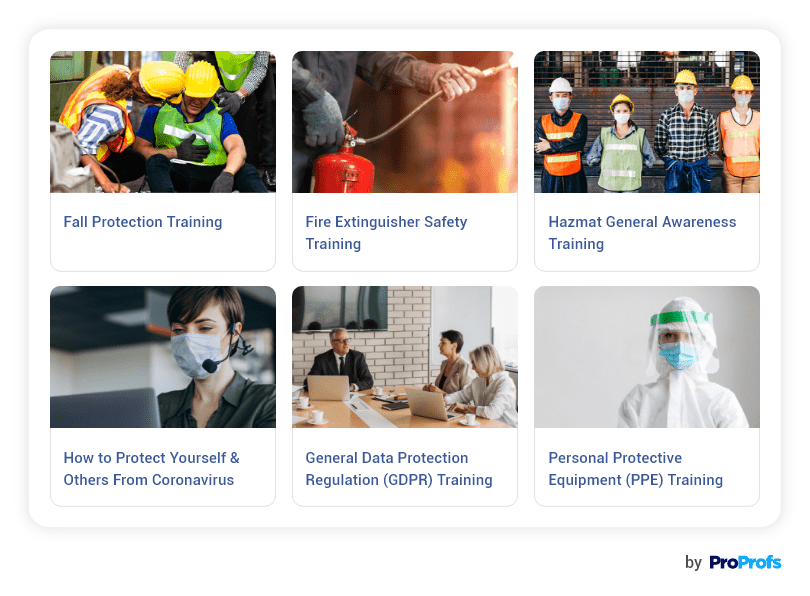
2. Compliance Courses
In industries governed by strict regulations, compliance courses are a necessity. They keep your staff up-to-date with the latest laws, standards, and company policies. This training often includes understanding legal obligations, ethical practices, and industry-specific guidelines.
Whether it’s HIPAA compliance for healthcare professionals or OSHA regulations for construction workers, compliance courses provide the necessary knowledge to avoid legal pitfalls. These courses can cover topics such as data protection, anti-corruption, anti-discrimination, anti-harassment, and environmental sustainability.
Related video: What is OSHA Compliance Training? Requirements & Benefits
3. Technical Training Courses
As technology evolves, so must the skills of your field staff. Technical courses focus on the practical, on-field skills needed for specific job roles – whether it’s operating new machinery, using software, or implementing new processes.
Hands-on training, workshops, and certifications are often a part of these courses, ensuring that your staff remains competent in a technologically advancing world.
ProProfs Training Maker’s technical course template lets you customize courses with predefined sections. You can also integrate multimedia content to make it more engaging for employees and set professional fonts.
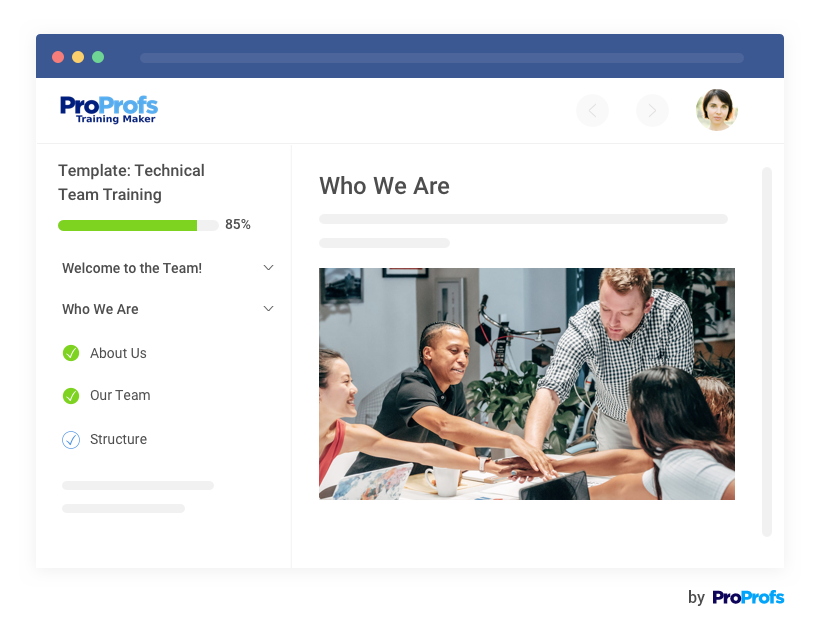
4. Soft-Skills / Communication Courses
Soft skills training like communication, teamwork, problem-solving, and adaptability are sometimes undervalued but are crucial for the success of your field staff. These courses teach employees how to develop and demonstrate interpersonal and behavioral skills.
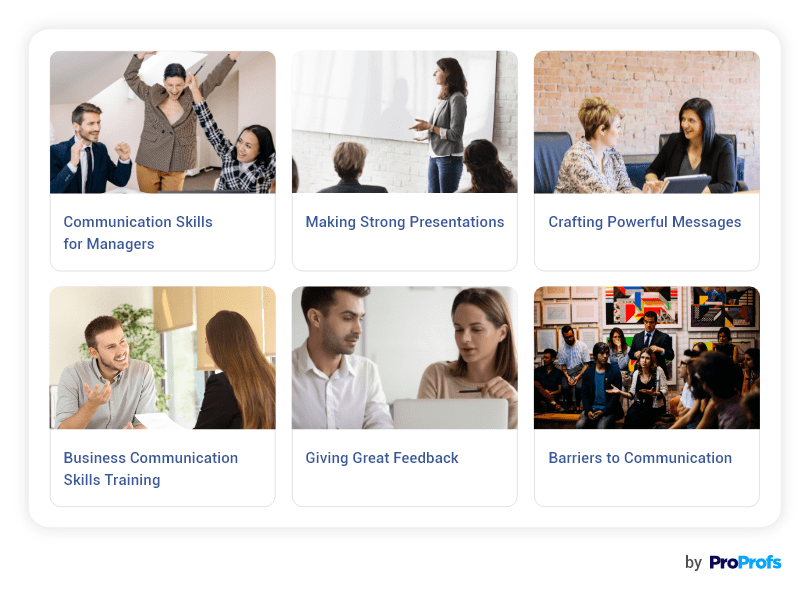
Effective communication and presentation skills are vital for field staff to convey information clearly and persuasively. Courses in this area can improve their verbal and written communication skills, enhancing client interactions and internal communication within the team.
5. Leadership Courses

If you want to teach field employees how to lead, manage, and motivate themselves and others, then leadership & management courses are a must.
These courses help employees in goal-setting, decision-making, delegation, and feedback. They develop the performance of employees, as well as create a culture of accountability and excellence.
6. Customer Service Courses
In industries where interaction with clients or customers is frequent, these courses enhance communication skills, conflict resolution, and service delivery. Customer service training courses are vital for roles in sales, hospitality, and retail to ensure that staff provides exceptional customer experiences.
Quality customer service can be a big differentiator for your business. These courses train your staff in the art of customer interaction – from handling complaints gracefully to building rapport with clients. Role-playing scenarios, communication skills workshops, and empathy training are common methods used.
You can create your own customer service training course using ProProfs Training Maker’s customizable templates.

7. Sales Courses
Field staff often engage in sales activities. Courses focused on sales techniques, objection handling, and negotiation skills can empower them to build strong customer relationships, close deals, and drive revenue.
Field training programs on sales and negotiation play a pivotal role in empowering your employees with techniques to effectively engage with potential customers and negotiate win-win agreements.
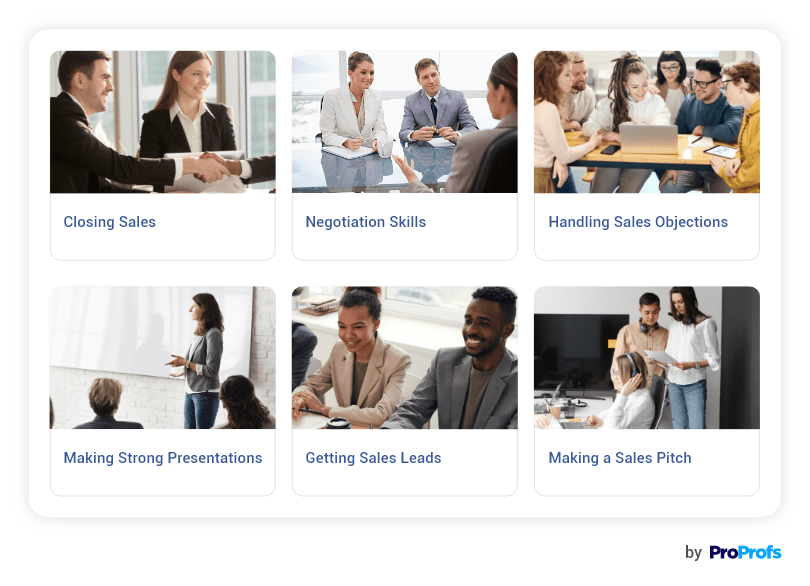
8. Retail Training Courses
These are critical for door-to-door retailers who engage in direct selling. They provide in-depth knowledge about a product’s features, benefits, and usage.
Equipping field staff with in-depth knowledge about your products or services is crucial to effectively communicate with customers and sell your offerings. In fields like technology or pharmaceuticals, where products are complex and constantly evolving, this training is particularly vital.
Get Free Employee Training Software — All Features, Forever.
We've helped 567 companies train 200,000+ employees. Create courses in under a minute with our AI LMS or use 200+ ready-made courses on compliance, harassment, DEI, onboarding, and more!
Factors to Consider When Choosing a Field Training Program
If you’ve read all the way here, you must be longing to know how to choose the right courses for field staff training.
Well, although that depends on your company’s training requirements, some factors stay the same regardless of which courses you choose. Let’s talk about them briefly.
#1 Relevance to Job Role
Ensure that the training courses align with your field staff’s specific needs and challenges. The content should address their unique roles and responsibilities, making it directly applicable to their day-to-day tasks.
For instance, technicians might require advanced technical training, while sales personnel may benefit from courses in customer relationship management.
#2 Learning Style Compatibility
People have diverse learning preferences, so effective training courses should cater to a variety of styles, such as visual, auditory, or kinesthetic learning. A blend of interactive modules, video tutorials, and practical exercises can cater to these varied preferences, ensuring a more engaging learning experience.
#3 Flexibility & Accessibility
Given the unpredictable nature of fieldwork, off-site staff education programs should offer flexibility in terms of scheduling and accessibility. Courses that provide on-demand access, mobile learning options, and adaptable schedules are ideal. This level of flexibility ensures that staff can engage with training at convenient times without compromising their field duties.
#4 Quality & Credibility of Content
The effectiveness of a training program hinges on the quality of its content and the expertise of its instructors. It’s important to choose courses from providers with a strong reputation and proven track record in the industry.
Validating the credibility and authority of these courses can involve checking accreditations, reading reviews, and seeking recommendations from industry peers, ensuring that the training is both authoritative and up-to-date.
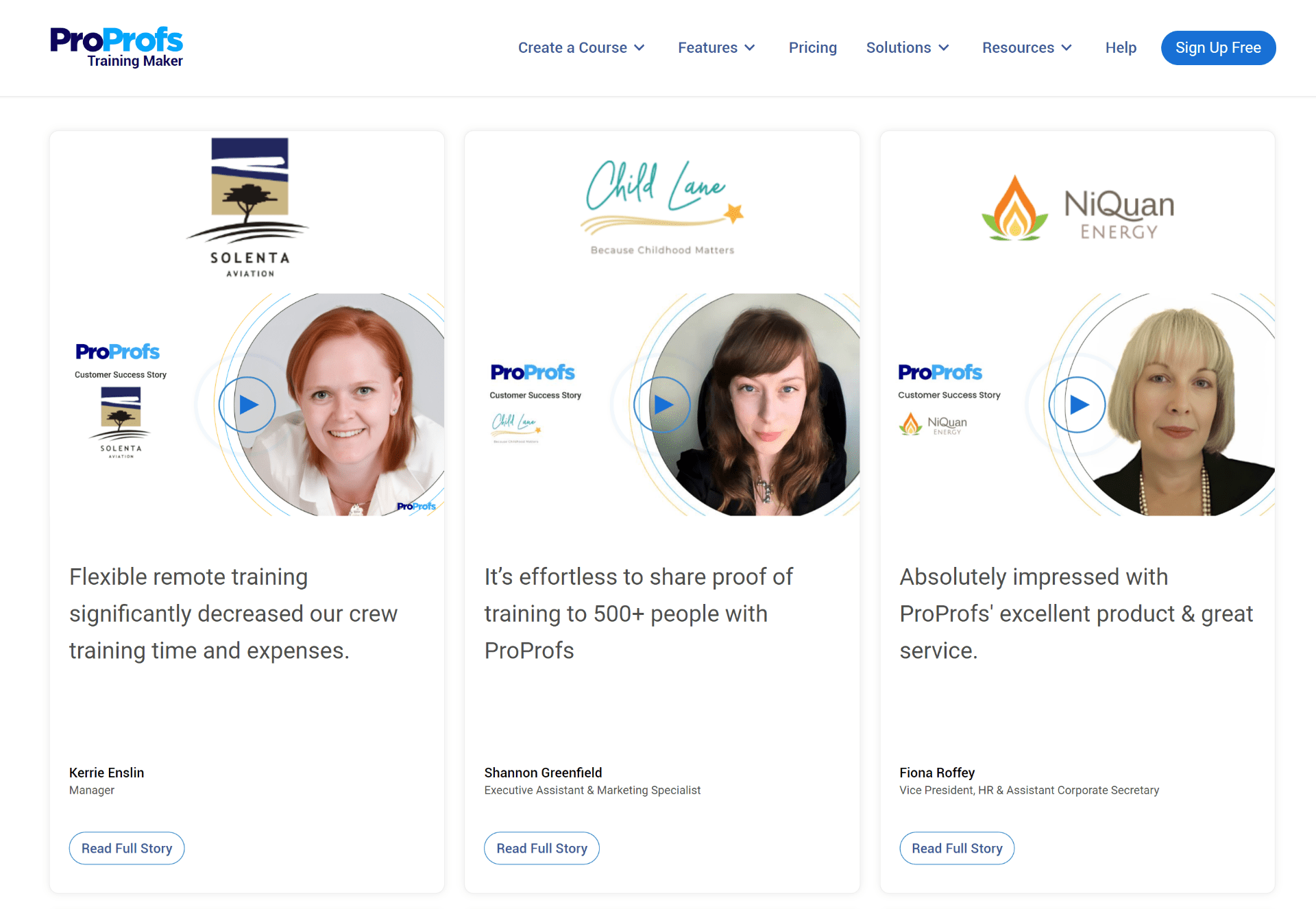
#5 Course Customizability
Look for training courses that can be customized to meet your specific requirements. The ability to tailor the content, examples, and exercises to your organization’s context ensures a more impactful and relevant learning experience.
For example, IQC Security & Loss Prevention Consultancy started using ProProfs Training Maker as they needed a customizable eLearning authoring tool. The result? They saw a steady increase in revenue as their customers grew.
Read the full story here.
#6 Evaluation & Assessments
A training program should not be a one-off event but a part of an ongoing process of growth and development. Choose courses that include mechanisms for feedback, both during and after the training. This feedback can be invaluable in measuring the effectiveness of the training, identifying areas of improvement, and tailoring future training to better meet the needs of your staff.
Look for courses that incorporate quizzes, tests, or practical assignments, allowing you to gauge the progress and knowledge retention of your field staff.
Ready to Take Field Staff Training to the Next Level?
As we move more towards a rapidly evolving tech world, it’s important to address employee skills and knowledge to ensure they don’t fall short.
One of the best ways to manage the outdoor workforce skills development is to invest in LMS software. Look for one like ProProfs Training Maker that has a wide variety of pre-built courses and ready-to-edit templates to create your own.
Also, when looking for a tool, keep the pricing factor in mind. For example, ProProfs Training Maker offers a free-forever plan for its LMS software. Regardless of which software you choose, always insist on a free trial to get a taste of it before investing.
 Tips
Tips
We’d love to hear your tips & suggestions on this article!
Get Free Employee Training Software — All Features, Forever.
We've helped 567 companies train 200,000+ employees. Create courses in under a minute with our AI LMS or use 200+ ready-made courses on compliance, harassment, DEI, onboarding, and more!

 We'd love your feedback!
We'd love your feedback! Thanks for your feedback!
Thanks for your feedback!







